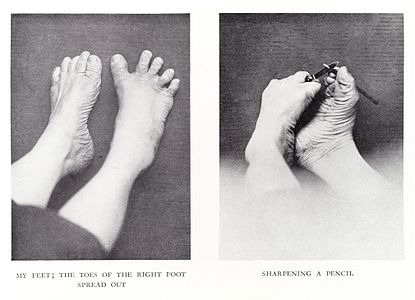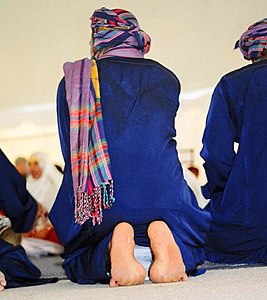Metatarsophalangeal joints
| Metatarsophalangeal joints | |
|---|---|
 The MTP, IP, PIP, and DIP joints of the foot:
| |
 Bones of the right foot; metatarsalphalangeal joints highlighted in an orange box | |
| Details | |
| Identifiers | |
| Latin | articulationes metatarsophalangeae |
| MeSH | D008683 |
| TA98 | A03.6.10.801 |
| TA2 | 1964 |
| FMA | 35222 71356, 35222 |
| Anatomical terminology | |
The metatarsophalangeal joints (MTP joints) are the joints between the metatarsal bones of the foot and the proximal bones (proximal phalanges) of the toes. They are analogous to the knuckles of the hand, and are consequently known as toe knuckles in common speech. They are condyloid joints, meaning that an elliptical or rounded surface (of the metatarsal bones) comes close to a shallow cavity (of the proximal phalanges). The region of skin directly below the joints forms the ball of the foot.
The ligaments are the plantar and two collateral.
Movements
The movements permitted in the metatarsophalangeal joints are flexion, extension, abduction, adduction and circumduction.
- Left: toes adducted (pulled towards the center) and spread (abducted); right, both feet clenched (plantar flexed)
- The upper foot is clenching (plantarflexing) at the MTP joints and at the joints of the toes; the central foot is lifting the toes (dorsiflexing) at the MTP joints; and the foot flat on the ground off to the side is in a neutral position.
- Kneeling with the MTP joints dorsiflexed (except the MTP joint of the little toe)
- Measuring the dorsiflexion of the MTP joints
See also
- Bunion
- Hallux rigidus (stiff big toe)
- Metatarsophalangeal joint sprain (turf toe)
- Knuckle
References
 This article incorporates text in the public domain from page 359 of the 20th edition of Gray's Anatomy (1918)
This article incorporates text in the public domain from page 359 of the 20th edition of Gray's Anatomy (1918)



